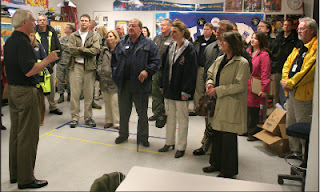LTC John Gentry Jr. takes command in ceremony September 11
2010-10-07 / Personalities
This date was chosen to remember the attack on American soil on September 11, 2001. The location held significance as the last time the 118th was mustered as a battalion, it was at Old Fort Jackson in October of 1812.
Among the speakers and special guests for the change of command were Brigadier General Maria Britt, Commanding General, Georgia Army National Guard, and Colonel Lee Durham, Deputy Commander of the 48th Brigade. LTC Gentry took over command from LTC Reginald Neal.
LTC Gentry’s military career began when he was commissioned as a 2nd Lieutenant in the Field Artillery on July 10, l991, through the Reserve Officers Training Corps at Presbyterian College in Clinton, S.C. His first assignment was as a Company Fire Support Officer in the 1st Battalion, 178th Field Artillery in the South Carolina Army National Guard.
Upon transferring to the Georgia Army National Guard, LTC Gentry served in the 1-214th FA, Joint Forces Headquarters, 122nd Rear Operations Center, 1-118th Field Artillery Regiment and Headquarters, 48th Infantry Brigade Combat Team.
His duty assignments include Fire Direction Officer, Platoon Leader, Firing Battery Commander and BN Intelligence Officer in the 1-214th FA; State Education Officer at Joint Forces Headquarters; Fire Support Officer in the 122nd ROC; Operations Officer in the 1-118th FAR and his current position at Brigade Fire Support Officer in HHC, 48th BCT.
LTC Gentry’s deployed assignments include Effects Coordinator for Multi-National Force North West and Multi-National Division- Baghdad’s Task Force Thunderbolt, Iraq; Information Operations Coordinator for Task Force Phoenix IX and Current Operations Officer for the International Security Assistance Forces Afghanistan Development Assistance Bureau, Afghanistan.
LTC Gentry is a graduate of the Army Command and General Staff College, Combined Arms Service Staff School, Fire Support Coordinator Course, Tactical Information Operations Course, Basic Airborne Course, Anti-Terrorism Course, Surveillance Detection Course, Human Resource Management Course and the Paladin Commanders Course. He has a bachelor’s degree from Presbyterian College and has completed course work toward a Masters in Public Administration from the American University in Washington, D.C.
His awards and decorations include the Bronze Star Medal, Defense Meritorious Service Medal, Army Commendation Medal 2nd award, Army Achievement Medal 2nd award, Army Reserve Components Achievement Medal 4th award, National Defense Medal with bronze star, Afghanistan Campaign Medal with campaign star, Iraq Campaign Medal with campaign star, Global War on Terror Service Medal, Army Forces Reserve Medal with M device 3rd award, Army Service Ribbon, Overseas Service Ribbon 2nd award, NATO Medal, Basic Parachute Badge and the Honorable Order of Saint Barbara.
LTC Gentry’s civilian employment is with the Oconee County Board of Commissioners where he serves as Director of Parks and Recreation in Watkinsville.
He is married to the former Katherine Pope of Washington. They have two daughters, Anna and Caroline.
Following the ceremony, LTC and Mrs. Gentry were hosts at a barbecue for the Battalion, dignitaries and guests.
Among family and friends attending the event with the Gentry family were extended family, J.C. and Johnnie Ann Gentry Carroll of Eutawville, S.C., Jason Gentry, Maggie and Ella, of Florence, S.C., Susan and Edward Pope Jr., and Edward, Susan and Wesley Pope, of Washington; a number of coworkers from the Oconee County Recreation Department; Oconee County Commissioner Margaret Hale, and family friend, Dana Connor of Holly Hill, S.C.



